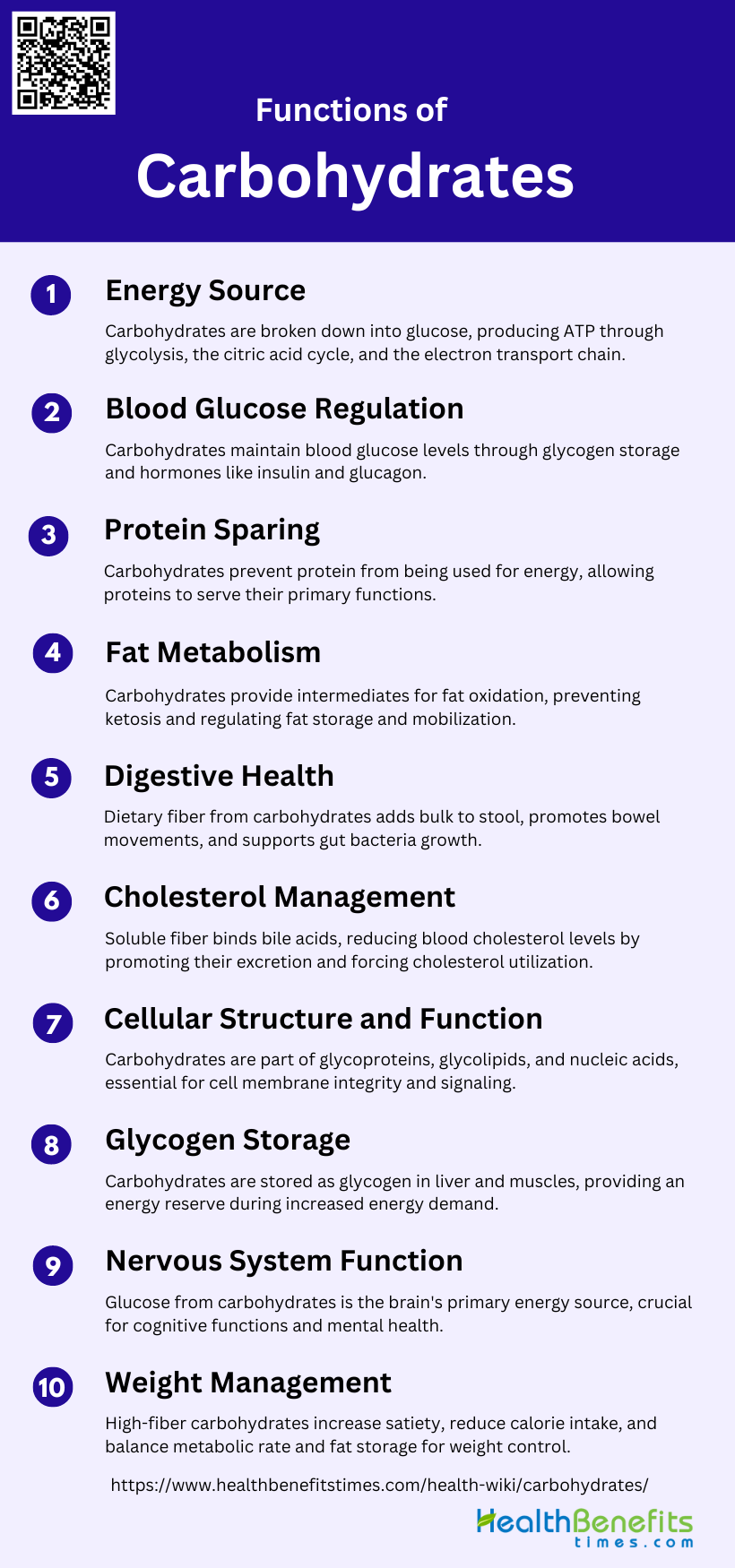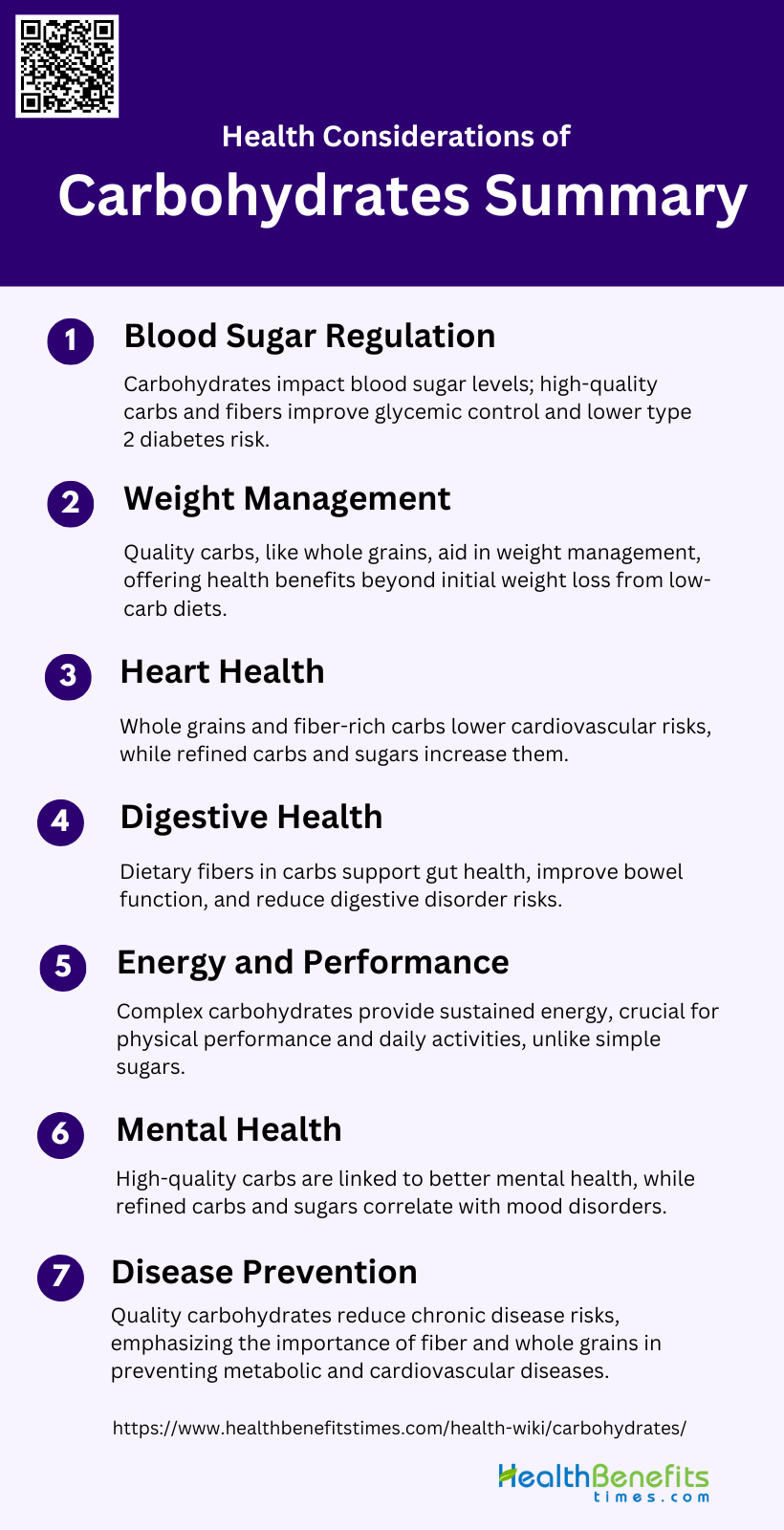Carbohydrates are essential biomolecules that play crucial roles in various biological processes and serve as a primary source of energy for living organisms. These organic compounds are composed of carbon, hydrogen, and oxygen atoms, typically in a ratio of 1:2:1 respectively. Carbohydrates can be classified into three main categories: monosaccharides (simple sugars), disaccharides (two linked monosaccharides), and polysaccharides (complex chains of multiple sugar units). They are found abundantly in nature and are vital components of foods such as fruits, vegetables, grains, and dairy products. In the human body, carbohydrates not only provide energy but also contribute to important functions like glycosylation of proteins, cell recognition, and structural support in plants (e.g., cellulose). The metabolism of carbohydrates is closely linked to insulin regulation and plays a significant role in maintaining blood glucose levels, making them a key consideration in nutrition and health management, particularly for conditions like diabetes.
Types of Carbohydrates
They are classified into two main types: simple carbohydrates and complex carbohydrates. Understanding these categories helps in making informed dietary choices.
1. Simple Carbohydrates
Simple carbohydrates, also known as sugars, include monosaccharides and disaccharides. Monosaccharides are the simplest form of carbohydrates and consist of single sugar molecules such as glucose, fructose, and galactose, which are crucial for energy production in human. Disaccharides are composed of two monosaccharide units linked together; common examples include sucrose (table sugar), lactose (milk sugar), and maltose. These simple sugars are rapidly digested and absorbed, providing quick energy but also potentially leading to rapid spikes in blood glucose levels. Their ease of digestion and sweetening properties make them prevalent in various foods and beverages.
2. Complex Carbohydrates
Complex carbohydrates are categorized into oligosaccharides and polysaccharides. Oligosaccharides consist of 3 to 20 monosaccharide units and are not fully digested by human enzymes, often reaching the colon where they are fermented by gut bacteria, contributing to gut health and potentially modulating glucose and lipid metabolism. Polysaccharides, such as starch, glycogen, and cellulose, are long chains of monosaccharide units and serve as energy storage or structural components in plants and animals. Starch, found in foods like potatoes and cereals, is a major energy source, while non-starch polysaccharides like cellulose provide dietary fiber, aiding in digestion and bowel health. These complex carbohydrates are digested more slowly, leading to a more gradual release of glucose into the bloodstream.
Sources of Carbohydrates
They can be sourced from both natural and processed foods, each offering different nutritional benefits. Here are the primary sources of carbohydrates:
- Grains: Whole grains like oats and barley are high-quality carbohydrates that reduce cardiometabolic risk factors, aid in weight loss, and lower the incidence of diabetes and cardiovascular diseases.
- Vegetables: Starchy and non-starchy vegetables are essential for a balanced diet, providing fiber that supports gastrointestinal health and lowers mortality rates in chronic kidney disease patients.
- Fruits: Fruits are nutrient-rich sources of natural sugars that contribute to lower mortality rates and provide essential vitamins and fiber, beneficial for overall health.
- Legumes: Beans, lentils, and chickpeas are high in fiber and protein, promoting gastrointestinal health and reducing the risk of diet-related diseases like cardiovascular disease and diabetes.
- Dairy Products: Milk and yogurt are important for a balanced diet, offering high-quality carbohydrates and beneficial sugars that support energy needs and overall health.
- Sugars and Sweets: Moderation is key for sugars and sweets, as excessive consumption, especially from sugar-sweetened beverages, can lead to obesity and cardiometabolic diseases.
- Beverages: Soda and other sweetened drinks should be consumed in moderation due to their high sugar content, while 100% fruit juices can be beneficial when consumed in controlled amounts.
- Nuts and Seeds: Nuts and seeds, though consumed in smaller amounts, provide beneficial carbohydrates and essential nutrients that support overall health.
Functions of Carbohydrates
They are essential for brain function, physical activity, and maintaining overall health. Here are the primary functions of carbohydrates:
1. Energy Source
Carbohydrates are the primary source of energy for the human body. They are broken down into glucose, which is then used in cellular respiration to produce adenosine triphosphate (ATP), the energy currency of cells. This process involves glycolysis, the citric acid cycle, and the electron transport chain, which collectively convert glucose into ATP, carbon dioxide, and water. The energy derived from carbohydrates is essential for various bodily functions, including muscle contraction, brain function, and maintaining body temperature.
2. Blood Glucose Regulation
The liver stores glucose in the form of glycogen and releases it into the bloodstream as needed to maintain homeostasis. This regulation is mediated by hormones such as insulin and glucagon. Insulin facilitates the uptake of glucose by cells, while glucagon promotes the release of glucose from glycogen stores. Proper regulation of blood glucose levels is vital for preventing conditions like hypoglycemia and hyperglycemia, which can lead to diabetes mellitus.
3. Protein Sparing
When carbohydrate intake is sufficient, proteins can be used for their primary functions, such as tissue repair, enzyme production, and immune function. In the absence of adequate carbohydrates, the body resorts to gluconeogenesis, a process that converts amino acids from proteins into glucose, thereby depleting protein reserves. This protein-sparing action is essential for maintaining muscle mass and overall health.
4. Fat Metabolism
Carbohydrates are integral to fat metabolism. They provide the necessary intermediates for the complete oxidation of fats. Without sufficient carbohydrates, the body cannot fully oxidize fats, leading to the production of ketone bodies, which can cause ketosis. Carbohydrates also influence the activity of enzymes involved in lipogenesis and lipolysis, thereby regulating fat storage and mobilization. This interplay between carbohydrates and fats is crucial for maintaining energy balance and metabolic health.
5. Digestive Health
Dietary carbohydrates, particularly fiber, are essential for digestive health. Fiber adds bulk to the stool and promotes regular bowel movements, preventing constipation. It also serves as a prebiotic, fostering the growth of beneficial gut bacteria. These bacteria ferment fiber to produce short-chain fatty acids, which have various health benefits, including anti-inflammatory effects and improved gut barrier function. A diet rich in fiber can reduce the risk of gastrointestinal disorders such as diverticulitis and colorectal cancer.
6. Cholesterol Management
Soluble fiber binds to bile acids in the intestine, preventing their reabsorption and promoting their excretion. This process forces the liver to use cholesterol to produce more bile acids, thereby lowering blood cholesterol levels. Studies have shown that diets high in soluble fiber can reduce total and low-density lipoprotein (LDL) cholesterol, which are risk factors for cardiovascular disease. This cholesterol-lowering effect contributes to overall cardiovascular health.
7. Cellular Structure and Function
Carbohydrates are vital components of cellular structures and functions. They are part of glycoproteins and glycolipids, which are essential for cell membrane integrity and cell signaling. Carbohydrates also contribute to the structural framework of nucleic acids, such as DNA and RNA, by forming the sugar-phosphate backbone. These structural roles are crucial for maintaining cellular integrity, facilitating cell communication, and ensuring proper cellular function.
8. Glycogen Storage
Glycogen serves as a readily available energy reserve that can be quickly mobilized during periods of increased energy demand, such as physical activity or fasting. The process of glycogenesis converts glucose into glycogen, while glycogenolysis breaks down glycogen back into glucose. This storage mechanism ensures a steady supply of glucose, maintaining energy homeostasis and supporting metabolic functions.
9. Nervous System Function
Carbohydrates are crucial for the proper functioning of the nervous system. Glucose is the primary energy source for the brain, which consumes about 20% of the body’s total energy. Adequate carbohydrate intake ensures a continuous supply of glucose to the brain, supporting cognitive functions, mood regulation, and overall mental health. Insufficient carbohydrate intake can lead to mental fatigue, impaired cognitive function, and mood disturbances.
10. Weight Management
Carbohydrates can influence weight management through their effects on satiety and energy balance. High-fiber carbohydrates increase feelings of fullness, reducing overall calorie intake. Additionally, the type and amount of carbohydrates consumed can affect metabolic rate and fat storage. Diets with a balanced carbohydrate-to-protein ratio have been shown to improve body composition and metabolic health. Proper carbohydrate intake, combined with physical activity, can aid in achieving and maintaining a healthy weight.
Good Carbs vs Bad Carbs
What is Good carbs?
Good carbohydrates, often referred to as “good carbs,” are those that provide essential nutrients and have a beneficial impact on health. These carbohydrates are typically found in whole, unprocessed foods that are rich in fiber, vitamins, and minerals. Examples of good carbs include whole grains (such as oats and barley), pulses, fruits, and vegetables. These foods have a low glycemic index, meaning they cause a slower and more gradual rise in blood sugar levels, which is beneficial for maintaining energy levels and reducing the risk of chronic diseases. Consuming diets rich in these high-quality carbohydrates has been associated with lower mortality rates and a reduced incidence of cardiovascular diseases, type 2 diabetes, and colorectal cancer. Additionally, high-quality carbohydrate sources like whole grains and fruits provide essential nutrients and substances that contribute to overall health and well-being.
What is Bad Carbs?
“Bad carbs” refer to carbohydrates that are refined, simple, and low in nutritional value. These types of carbohydrates are often found in highly processed foods and can have detrimental effects on health. Examples of bad carbs include highly polished rice, refined wheat, sugar, glucose, cookies, pastries, fruit juice, sweetened beverages, and fried potatoes or French fries. The consumption of these bad carbs is linked to various health issues such as metabolic syndrome, type 2 diabetes, cardiovascular diseases, and obesity. Unlike complex carbohydrates, which provide essential nutrients and fiber, bad carbs can lead to rapid spikes in blood sugar levels, increased insulin resistance, and subsequent health complications. Therefore, it is crucial to limit the intake of these refined and simple carbohydrates to maintain overall health and well-being.
Recommended Intake of Carbohydrates
The recommended intake of carbohydrates varies based on factors such as age, gender, activity level, and overall health. Carbohydrates should make up a significant portion of your daily caloric intake to ensure adequate energy levels. Here are the general guidelines for carbohydrate consumption:
1. RDA Guidelines
The Recommended Dietary Allowance (RDA) for carbohydrates is established to meet the energy requirements of the central nervous system, which primarily relies on glucose. For adults, the RDA is set at a minimum of 130 grams per day, which is considered sufficient to prevent ketosis and provide adequate glucose for brain function. This guideline is part of the broader Dietary Reference Intakes (DRIs) that also include values for other macronutrients such as protein and fat. The RDA aims to cover the needs of nearly all (97-98%) healthy individuals in a specific age and gender group.
2. Percentage of Daily Calories
The Acceptable Macronutrient Distribution Range (AMDR) for carbohydrates is set at 45-65% of total daily caloric intake. This range is designed to provide flexibility in dietary planning while ensuring sufficient carbohydrate intake to meet energy needs and support overall health. Studies have shown that both low (<40%) and high (>70%) carbohydrate intakes are associated with increased mortality, suggesting that a moderate intake within the AMDR is optimal for longevity. This range also allows for the inclusion of a variety of carbohydrate sources, including whole grains, fruits, and vegetables, which are essential for a balanced diet.
3. Individual Needs
Individual carbohydrate needs can vary significantly based on factors such as age, sex, and physical activity level. For instance, athletes may require higher carbohydrate intake to support energy expenditure during training and competition, with recommendations ranging from 5 to 10 grams per kilogram of body weight per day. Age also plays a role; children and adolescents may need more carbohydrates to support growth and development, while older adults might require adjustments based on metabolic changes and activity levels. Additionally, sex differences can influence carbohydrate metabolism and requirements, with some studies indicating that female athletes, particularly those in endurance sports, may struggle to meet carbohydrate intake guidelines due to energy restriction for weight management.
Health Considerations of Carbohydrates
Carbohydrates play a crucial role in maintaining overall health by providing essential energy for bodily functions. Understanding the recommended intake of carbohydrates is vital to ensure balanced nutrition and prevent health issues. Below are key guidelines and considerations for carbohydrate consumption:
1. Blood Sugar Regulation
Carbohydrates significantly influence blood sugar levels, particularly in the postprandial period. The rate of carbohydrate digestion and absorption is crucial, with dietary fibers playing a key role in modulating glucose levels by delaying gastric emptying and slowing carbohydrate digestion. High-quality carbohydrates, such as whole grains and fruits, are associated with better glycemic control and reduced risk of type 2 diabetes.
2. Weight Management
Low-carbohydrate diets are often promoted for weight loss, but their long-term effectiveness remains debated. While they can lead to initial weight loss, high-quality carbohydrate diets emphasizing whole grains and fiber are also effective for weight management and may offer additional health benefits. The quality of carbohydrates, rather than the quantity, is crucial for sustainable weight management.
3. Heart Health
The impact of carbohydrates on heart health is complex. High-quality carbohydrates, such as those found in whole grains and fiber-rich foods, are linked to reduced cardiovascular risk factors, including lower cholesterol and blood pressure levels. Conversely, diets high in refined carbohydrates and sugars are associated with increased cardiovascular risk.
4. Digestive Health
Carbohydrates, particularly dietary fibers, are essential for digestive health. They support the growth of beneficial gut microbiota, which in turn produce short-chain fatty acids that promote gut health and overall well-being. High-fiber diets are associated with improved bowel function and reduced risk of digestive disorders.
5. Energy and Performance
Carbohydrates are a primary energy source, crucial for physical performance and daily activities. The type of carbohydrate consumed affects energy levels, with complex carbohydrates providing sustained energy release compared to simple sugars, which can lead to rapid spikes and crashes in energy. High-quality carbohydrates are essential for maintaining optimal energy levels and performance.
6. Mental Health
Carbohydrates also play a role in mental health. Diets high in refined carbohydrates and sugars are linked to mood disorders, including anxiety and depression, due to their impact on blood sugar levels and gut microbiota. Conversely, high-quality carbohydrates, such as those found in whole grains and fruits, are associated with better mental health outcomes.
7. Disease Prevention
High-quality carbohydrates are associated with a reduced risk of several chronic diseases, including cardiovascular diseases, type 2 diabetes, and certain cancers. Diets rich in fiber and whole grains are particularly beneficial, highlighting the importance of carbohydrate quality in disease prevention. Reducing the intake of refined carbohydrates and sugars is crucial for preventing metabolic and cardiovascular diseases.
Common Myths about Carbohydrates
It’s important to separate fact from fiction to make informed nutritional choices. Here are some common myths about carbohydrates:
1. Carbs Cause Weight Gain
The belief that carbohydrates inherently cause weight gain is a common misconception. While it is true that excessive consumption of certain types of carbohydrates, particularly those found in sugar-sweetened beverages (SSBs) and refined grains, can contribute to weight gain, not all carbohydrates have this effect. Studies have shown that high-quality carbohydrates, such as those found in whole grains, fruits, and vegetables, can actually aid in weight management and improve cardiometabolic health. For instance, high-fiber carbohydrates are associated with a lesser degree of weight gain and can even promote weight loss by enhancing satiety and reducing overall calorie intake. Therefore, it is the quality and type of carbohydrate, rather than carbohydrates in general, that play a crucial role in weight management.
2. All Carbs Are Bad for You
The notion that all carbohydrates are detrimental to health is overly simplistic and misleading. Carbohydrates are a diverse group of macronutrients that include sugars, starches, and fibers, each with different effects on the body. High-quality carbohydrates, such as those found in whole grains, fruits, and legumes, are essential for a balanced diet and provide numerous health benefits, including improved digestive health and reduced risk of chronic diseases. Conversely, low-quality carbohydrates, such as those found in sugary drinks and refined grains, can contribute to health issues like obesity and diabetes. Therefore, it is important to focus on the quality of carbohydrates consumed rather than eliminating them entirely from the diet.
3. You Should Avoid Carbs to Be Healthy
Avoiding carbohydrates entirely is not necessary for maintaining good health and can even be counterproductive. While low-carbohydrate diets can lead to short-term weight loss and improvements in certain metabolic markers, they are not superior to balanced diets that include high-quality carbohydrates for long-term health outcomes. Moreover, completely eliminating carbohydrates can lead to nutrient deficiencies and other health issues, such as increased risk of cardiovascular disease and loss of lean body mass. Instead of avoiding carbohydrates, individuals should aim to consume a balanced diet that includes a variety of high-quality carbohydrates, which can support overall health and well-being.




